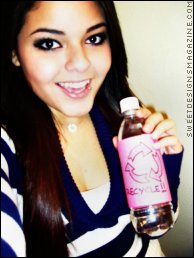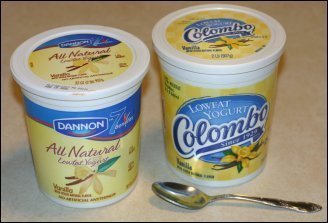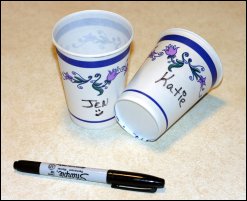Going Green
By Stephanie Lynn, age 23, Massachusetts
SDM Editor-in-Chief



It seems these days that everyone is taking an interest in helping the environment, or "going green". Any honest scientist can tell you that global warming is on a steep rise and will impact us in very bad ways within our own lifetime, but there are many small changes you can make to your everyday schedule which will make an impact. Encourage your friends to make a few changes as well, and the effect will grow until the situation is stable again. I've already committed myself to making some small changes in my own household.
Although you've probably heard this a million times, the recycling or reusing of everyday product containers is an easy but important way to do something that really helps. I'm sure some of you buy a new water bottle every day at school. Instead of wasting the dollar or so on every water bottle, take your empty bottle home with you at the end of the day. Then fill it up with tap water. I suggest filtering it unless you have good quality water. Toss a bottle or two in the fridge for tomorrow. I hardly ever buy water anymore. I just keep refilling the same 10 or so bottles every day. But this is important: Be sure to give both bottles and caps a good washing to kill germs.* And remember that sharing opened bottles with friends and family means sharing germs. You can also buy larger, insulated bottles at places like Wal-Mart or Target. Remember, this little bit of effort not only saves the environment, but you will also save up to $300 a year!

We are also very careful with the amount of hot water we use in our home. It takes a lot more energy to heat the water than you may realize. I always wash my clothes in cold water. If I have only a small load of laundry to do, I usually hand wash them in a bathroom sink. You can also sometimes avoid dryer use, and when you use it be sure to always clean the lint trap.
Another tip: Don't run the dishwasher until it's completely full, or else hand wash your dishes. In my home, we usually hand wash the larger pots and pans to save room in the dishwasher for smaller items. Therefore we run the dishwasher less often and as a result save money on our energy bills.

Buy yogurt in 2 pound containers, then reuse them for leftovers.
Small ways to help our environment and our health:
♥ Change at least one light bulb to an energy efficient bulb.♥ Turn off and unplug appliances when not in use.
♥ Bring your own mugs to coffee shops that you visit often like Starbucks.
♥ Plant trees.
♥ Recycle your glass, plastics, newspapers, aluminum cans, loose leaf notebook paper, etc.
♥ Avoid food and toy products with excessive packaging.
♥ Reuse kitchen items like plastic plates, aluminum foil, and plastic wrap.
♥ Use the same drinking glass throughout the day.
♥ Use canvas bags for your groceries rather than plastic or paper. If you do use paper or plastic, save and reuse them for other tasks. Paper bags can be used to cover your schoolbooks.
♥ Turn off the lights when you leave a room.
♥ Try organic foods. Organic vegetables do not have the pesticides that other vegetables contain.
♥ Buy large containers of foods like plain or vanilla yogurt, rather than many small ones. Not only is this more economical, but you can reuse the large containers to store food leftovers afterwards.
♥ Limit your showers to 5-10 minutes. Showers lasting 20 or more minutes use way too much water and energy.
♥ Donate or give away clothes you no longer want.

Switch off the lights when you leave a room.
♥ Use cloth napkins that you can wash after each use rather than paper napkins. Don't throw away unused napkins at fast food restaurants. Leave them on the table for others to use or take them with you. Don't take more napkins than you really need. You can always get more. The same with paper towels in the rest room.
♥ Don't take the car or ask your parents for a ride to any place that's near and safe enough to walk or ride your bicycle. Don't ride/drive around just because you're bored.

♥ When you go to buy your first car, don't buy a honking big SUV that you don't really need. Your parents' generation loves them, but many don't really need them, and they're killing our planet and our American way of life. It's like mailing half of our life savings to unfriendly governments. Buy a hybrid or an economy car. And needless to say, then you'll have money for other things.
♥ Avoid styrofoam cups and plates at parties and when picnicking. Styrofoam is not biodegradable. It does not naturally decompose. If you're throwing a party, lay out some magic markers, and ask your guests to mark their paper cups. That way they won't lose track of which cup is theirs and get another one ... and then another.

♥ Don't shop just because you're bored. Consuming = polluting. Save your money. Someday there will be something you'll really want or need. And you'll have the money for it!!
I challenge you all to choose at least 3 different items mentioned in this article, and get into the habit of doing them every day for the next month. If every reader of Sweet Designs Magazine mastered half of the list above and told 5 friends to do the same, we could make a huge impact on our society's energy use and stop global warming. I hope you're up for the challenge!
Thanks,
Stephanie Lynn
* There are two ways to clean your bottles AND caps for reuse. 1) Soap and water, then rinse thoroughly. Then shake half a bottle of clean water vigorously with the cap on, then empty and refill. 2) Shake half a bottle of clean water vigorously with the cap on, then dry both the bottle and cap upside down in a rack for 24 hours. Germs can't live for long on a totally dry surface. If it's dry, they die.





